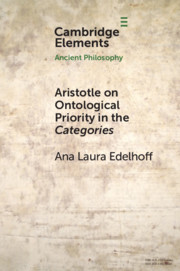Element contents
Aristotle on Ontological Priority in the Categories
Published online by Cambridge University Press: 23 October 2020
Summary
- Type
- Element
- Information
- Series: Elements in Ancient PhilosophyOnline ISBN: 9781108874243Publisher: Cambridge University PressPrint publication: 19 November 2020
References
- 9
- Cited by

